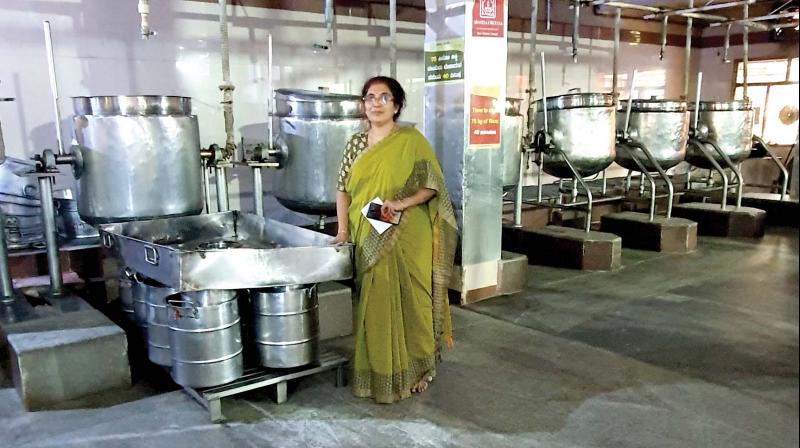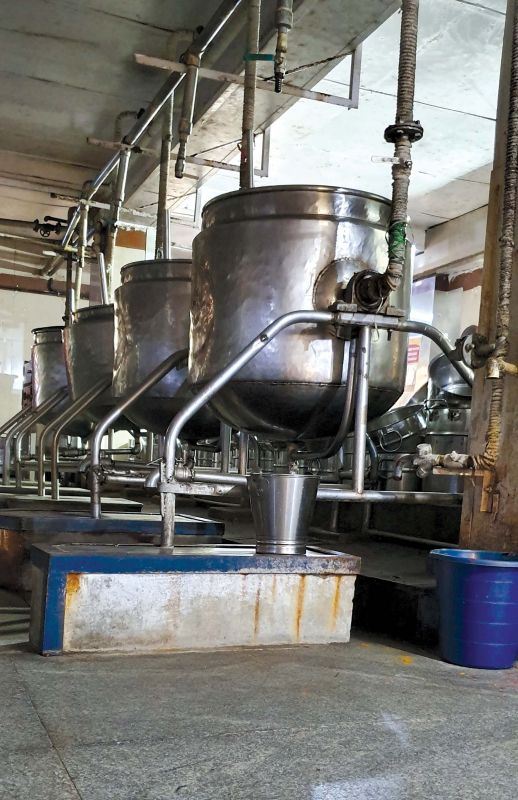‘Ananth’ for 2 lakh kids: Tejaswini keeps legacy alive
She spends her days overseeing the Bengaluru kitchen, a sprawling set up that she has designed herself.

Over 10,000 kilos of rice and sambar make their way out of the old building in Gavipura every day. This is Adamya Chetana, a trust set up by the late BJP leader and MP Ananth Kumar and now run by his widow, BJP state Vice-President and Adamya Chetana Chairperson, Tejaswini AnanthKumar. Her 2019 foray into politics didn’t quite go according to plan but as a proponent of eco-friendly lifestyles and social work, Tejaswini AnanthKumar’s idealism hasn’t been too badly dented. She spends her days overseeing the Bengaluru kitchen, a sprawling set up that she has designed herself, from the zero-waste model to the little innovations that help it run so well. She tells Darshana Ramdev about her life with the down-to-earth Ananth Kumar, the unsung hero of the BJP in Karnataka.
The clamour of steel dies down as lunch time approaches - at Adamya Chethana, the day’s work is done. Outside, waves of heat still radiate from the boiler, smoke making its way through a network of pipes and into a water chamber, where it is filtered. It’s a tricky little path, a single misstep could send you face-first onto a hot pipe, but Tejaswini AnanthKumar leaps, saree and all, with great agility, from one ledge to the next. “I know every inch of this place,” she laughs. Full of exuberance and a sense of humour, too, she shoulders her responsibilities with aplomb – running the Adamya Chetana trust, set up by her husband, the late BJP leader and MP Ananth Kumar, is now solely hers. One thing is clear - feeding two lakh children across the state is no mean feat.
The setup runs with industrial efficiency - rice is loaded into the line of containers, each with a 75 kilo capacity. It is steamed and ready in about 40 minutes, according to a board nearby. “The process has been broken down to the point where I don’t actually need cooks anymore,” Tejaswini jokes (they do have cooks, though). “Three giant steel containers stand in another corner - this is where the sambar is made, about 5000 litres in all. Apart from this, 8000 litres of milk is boiled and packed with the meal - in Bengaluru alone, the kitchen caters to around 290 schools. This is about one-third of their production capacity - three kitchens in Kalburagi, Hubbali and Jodphur (Rajasthan) supply rural schools in their vicinity with midday meals. It’s simple enough fare - anna sambar and a glass of milk for five days, bisibelebath and payasam on the last two.
“When we started, we considered bringing a consultant on board but they’re expensive and we had no money,” Tejaswini recalls. This was back in 1997, when the kitchen first opened. “We had to innovate and it’s not that difficult, really. The trouble is, most people don’t use common sense anymore!” Anna Akshara Arogya, apart from being one of the largest suppliers of free mid-day meals in the state, is also a zero-waste kitchen. It’s a self-sustained operation, with everything accounted for, down to the last drop of water. Even the water used to collect soot from the boiler is filtered and then used to rinse the vehicles.

Vegetable remains go to BBMP and the revenue it raises buys the briquettes made from compressed, bio-degradable waste, from a factory in Tumakkuru – 1.5 tonnes every day. Work begins at 2.30 am, the meals are ready to go by 7.30 am and sent out in the 26 vehicles the trust owns. Waste generated and coconut husks generate bio fuel, used to roast the masalas and for smaller cooking needs. Last year, Adamya Chetana even set up a ‘plate bank’ that supplies steel cutlery to various events, free of charge, just to promote sustainable, plastic-free lifestyles. “BBMP has tried to ban plastic and so on but you go to their events and you will see quite a bit of it! I have taken to asking them myself,” she laughs.
“I supply food to the school I studied in, from the kitchen in Hubbali,” says Tejaswini. This is obviously a point of pride, looking back, it was growing up in rural North Karnataka that made her aware of hardships that exist outside the haven of urban life. “Back then, we didn’t know what poverty was, or the environment. It was a simpler time!” Her father, an irrigation engineer working in the Public Works Department, meant life had a semblance of modernity, but only at home. “My father had appointed someone to bring us the 40 pots of water we required every day, but the water from the lake was the colour of tea! In a week, we didn’t have white clothes anymore! But we didn’t mind, these things matter more in a city,” she says, pausing for a moment before adding, “People in cities have to unlearn a lot of things, don’t you think?”
It’s a Friday afternoon in Basavanagudi and there is, quite predictably, no electricity. Tejaswini Ananthkumar sits in her office on the first floor, away from the noise below. It’s only when her visitor walks in that she allows the generators to be switched on so the air conditioner works. “My husband was a great advocate of a green lifestyle,” she says. “He would always say that if you want a green life in a city, change yourself. Charity begins at home.” Perhaps she doesn’t intend it, but her eyes fill with tears as she recounts their life together.
Tejaswini was in college when she heard the activist, Dattatreya Hosabale, make a rousing speech on Savarkar. Young and idealistic, she was captivated and joined the ABVP. “I love politics and all but for me, it was about making a difference in society,” she says. “That was the sort of family in which I was raised.” She and her siblings grew up hearing stories of the freedom struggle, of the bravery of Shivaji, from their horseback-riding great grandmother, who was nearly 80 by that time. “She was from a freedom fighter’s family, you know.” Her great grandmother was from Nargund, a small princely state ruled by Nargund Baba Saheb, who was decapitated in return for his efforts to fend off the British.
Her great grandmother, widowed at 21, was expected to shave her head in keeping with local custom. “By that time, a lot of people from Karnataka supported leaders like Bal Gangadhar Tilak and Raja Ram Mohan Roy, who were bringing reforms into Hinduism. My great grandmother and her father-in-law were amongst them and they would not give in. After her father-in-law passed away, she began stitching clothes to make ends meet and raise her children. This was unheard of then.”
She graduated from college in Hubbali with a degree in Electrical Engineering and married Ananth Kumar in 1989, whom she met through ABVP. The match surprised many - why did a highly-qualified engineer like herself marry a “B.A.-L.L.B” like Kumar, who had joined BJP by that time. “When we married, BJP had two MPs across the country,” she laughs. “We never imagined then that in ten years, my husband would be an MP in Delhi!” Those were hectic years and Tejaswini was the earning member of the family, working at Aeronautical Development Agency, the nodal agency working on the Light Combat Aircraft. “When he became an MP, I thought, I married him to support him, so I quit my job. I wonder sometimes how things would have been if I hadn’t but really, I have no regrets.”
The spending money she offered her husband as he set out every morning, was invariably rejected. “He never felt the need for it , even in Delhi, he always rode the Metro! Besides, he would always say that if he couldn’t convince the person beside him to get him a cup of tea, he had no hope in politics!” The money would be returned, unspent. When the MP’s old friends and peers from the ABVP came together to conduct a memorial service, they would recall, rather tearfully, memories of him on his bicycle, “riding doubles,” as Tejaswini puts it,” across the state. “I convinced him to buy a Reva in 2004, which I drove and then another Mahindra electric vehicle last year, which was his first and last asset. I have those testimonials recorded in full, it’s time to work on a book.”

